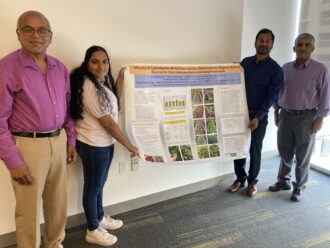MIAMI, Florida – The future of sustainable agriculture is in the hands of the next generation of scientists, and one Florida high school student had the opportunity to work side-by-side with Florida International University (FIU) researchers in finding solutions to our most challenging agricultural problems.
Sri Madabhushi, who graduated from Pembroke Pines Charter High School in June, was part of a Southern Sustainable Agriculture Research and Education (SSARE)-funded project in studying the effects of cyanobacteria as a biofertilizer in tomato and okra production. Her research project was funded through the SSARE James Harrison Hill, Sr. Young Scholar Enhancement Grant Program.
Mentored by FIU agroecologist Krish Jayachandran, FIU Earth and Environment post doctorate associate Saoli Chanda, and Texas A&M University - Kingsville soil scientist Sanku Dattamudi, Madabhushi tested the efficacy of cyanobacteria biofertilizer against other chicken manure, vermicompost and synthetic fertilizers for raised bed okra production. Her study was part of the researchers’ larger SSARE Research and Education Grant project, “The Use of Cyanobacteria Biofertilizers to Increase Crop Productivity, Improve Soil Health, and Agricultural Sustainability in Florida.” The purpose of the project is to determine if cyanobacteria (microrganisms responsible for algal blooms) can be just as effective or more effective than synthetic fertilizers in southern Florida vegetable production. The results could help manage an environmental issue while providing farmers with a more sustainable product to increase the health of their crops and soil.
“The research project was very satisfying. I took the theoretical aspects of my courses and applied them in the experiment. I didn’t know much about agriculture prior to working on this project” said Madabhushi, who has an interest in microbiology. “But I learned a lot about working on experiments through the different scientific treatments and the lab analysis. I felt that working on this project was a unique way of studying more about microbiology.”
Madabhusi hosted a field day to discuss her project and invited students from her environmental club at school to attend.
Jayachandran said that Madabhushi’s participation in the research project taught her more about plant anatomy; the process of conducting a scientific experiment, such as measuring plant height and nutrient content; and laboratory methods.
“The Young Scholar Enhancement Program introduces community and leadership building and communication skills to students and helps them develop skills in areas of research that will help as they pursue their careers,” said Jayachandran.
For Madabhushi, participating in the project reaffirmed her career interests. She plans to pursue microbiology in college.
The SSARE James Harrison Hill, Sr. Young Scholar Enhancement Grant Program is available to researchers with active SSARE Research and Education Grant projects. Since 2021, 35 high school or undergraduate college students have participated in the program, totaling $137,501.
